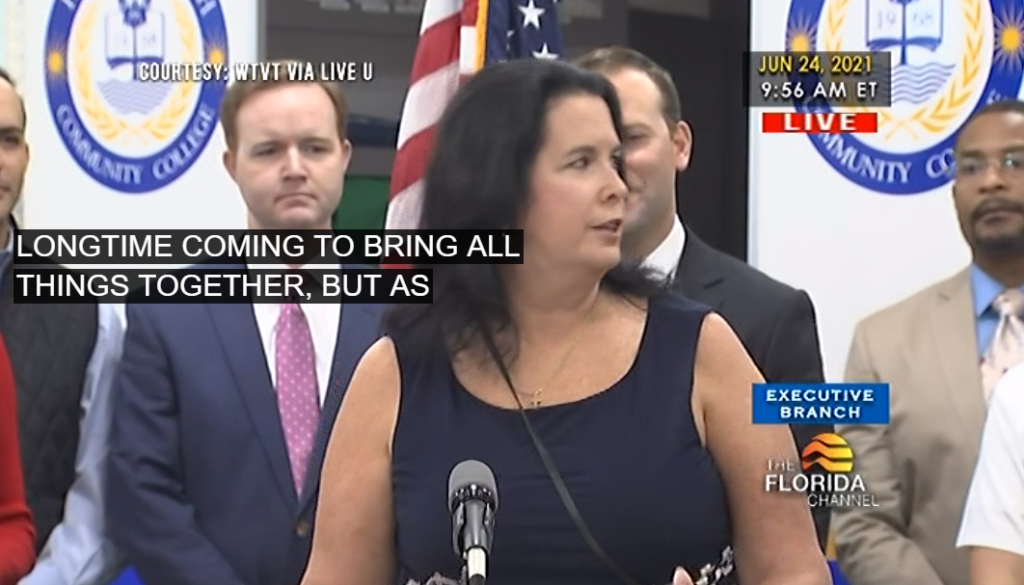
Florida students who are homeschooled or who attend private high schools will have more opportunity to earn college course credits this fall as the result of a bill Gov. Ron DeSantis signed into law earlier today.
SB 52 sets aside $15.5 million in state money to cover the costs for homeschooled and private school students who participate in dual enrollment programs by taking courses from a partnering college or university. It corrects a glitch in state law that for the past eight years left the state without a funding mechanism to cover the tuition and fees of dual enrollment students who did not attend public schools.
As a consequence, the number of private schools offering dual enrollment programs decreased steadily as more were unable to absorb the costs for their students.
“We need to make sure students have all the choices that are best for them,” said DeSantis, who signed SB 52 as part of a workforce development legislative initiative. “There are no choices that are inferior to other choices. There’s a whole bunch of different pathways to success.”
In addition, the bill covers tuition and fees for students who take dual enrollment classes in the summer, starting in 2022.
Issues surrounding dual enrollment funding occurred in 2013 when a change in the law shifted the cost of dual enrollment programs from colleges to school districts. Because school districts are state funded, the state picked up the cost. But private schools, which were not allowed pass the cost on to their students, had no alternative but to limit their dual enrollment offerings. (The law already prohibited colleges passing along the costs directly to homeschooled students.)
The number of students in private schools taking dual enrollment courses decreased by 60%, even as public school student enrollment doubled during the same period.
The situation dramatically affected school choice scholarship students. During the same enrollment period, the number of lower-income students attending private schools on Florida Tax Credit Scholarships more than quadrupled, putting more lower-income students at an even greater disadvantage.
Lawmakers have tried for the past few years to clarify the issue, but proposed legislation never made it to the governor’s desk despite bipartisan support.
“Over the years, we have seen that dual enrollment provides a huge step in the right direction for students who go on to pursue a college or university degree. These programs not only reduce the cost of higher education, but also the time it takes to complete a higher education degree program, which has proven to be a huge benefit for lower-income and first-generation college students,” said Sen. Kelli Stargel R-Lakeland, chair of the Senate Committee on Appropriations.
“With a historic expansion of school choice for lower-income families signed into law earlier this year, now is certainly the time to expand the tremendous benefits of dual enrollment opportunities to students in private, home, or virtual education settings,” Stargel said.
Stakeholders praised the change, saying it would restore equity to all students across the state. It especially benefits economically disadvantaged students who rely on state school choice scholarship programs to attend private schools.
“Dual Enrollment has significant academic benefits for students, and this bill gives students equal access to these benefits regardless of where they attend school,” said Michael Barrett, education associate for the Florida Conference of Catholic Bishops, which supported the bill throughout the 2021 legislative session.
James Herzog, who represents the Florida Association of Academic Non-Public Schools, another group that formally supported the bill, said it would reverse downward trendlines that have occurred during the past decade in the numbers of students participating in dual enrollment programs.
“Florida has seen an alarming 60% drop in dual enrollment participation by students from independent and faith-based schools during the past decade,” he said. “High schools that have been unable to absorb the cost of offering dual enrollment have been forced to discontinue access. Florida leaders have once again leveled the playing field by increasing dual enrollment opportunities for all students whether attending public or nonpublic schools or home education programs.”
Steven Hicks, vice president of operations for Center Academy, which operates 10 campuses in Florida for students with learning differences, praised lawmakers for passing the legislation, which he says inspires more of his students to pursue degrees by allowing them to try out college and gain confidence while in high school.
“Studies clearly show that students who have an opportunity to take dual enrollment courses are more likely to attend a college after high school,” he said. “The fact that so many families, like the ones we serve, were not able to take advantage of this opportunity due to financial or other reasons was extremely frustrating. Going forward because of the boldness of Governor DeSantis and key legislators, private schools students, especially those with disabilities or from low-income families, will now have the same opportunity, as other students, to take advantage of dual enrollment. We applaud all of you for your great work.”



Does this also include students on the special needs scholarship?